Future Trek
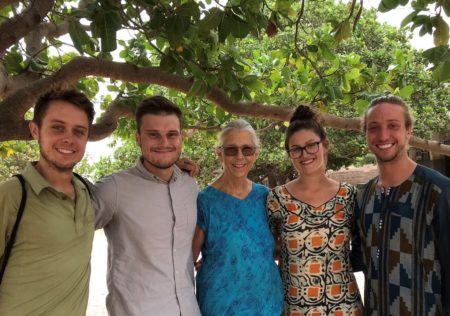
I participated in an event called Future Trek, facilitated by the Education Sector. There were three groups of PCVs that presented programs at six different Senior Secondary Schools in the North Bank Region (NBR) on the weekend of June 23-24. This was the second year Future Trek targeted schools in the NBR, and next year Future Trek will be held in a different region for two years. The goal of this project is to produce students who are successful leaders at their schools and in their communities, by teaching boys and girls the importance of working as equals to build economically-sustainable communities.
Prior to Future Trek 2018, Education PCVs visited each of the six selected schools and spoke with the students and teachers to gauge what topics they were interested in exploring. From the students’ input, Education PCVs and teachers developed a curriculum tailored to the students situations, to be presented by PCVs and teacher counterparts during Future Trek. I was impressed with the planning the Education PCV leaders did to prepare all of us, especially since my team did not have any Education PCVs – Mike Bride is from the Health Sector and Corey Bruecker, Andy Queen, Zach Lawrence and myself are Agriculture Volunteers.
The curriculum included five topics: Advocacy, Healthy & Unhealthy Relationships, Gender Equality, Sex Education, and Stress Management. Events at the two schools also touched on the importance of role models, leadership skills, and the implications of early-marriage. This program reaches girls at a crucial time, when many are choosing whether to stay in school or leave for marriage. UNICEF states that 46.5% of all Gambian girls are married before the legal age of 18, and that problem is greater in the rural areas up country.
At the end of the Future Trek events, students were selected to participate in an in-depth training called Camp GLOW (Girls and Guys Leading Our World). Camp GLOW is a five day event held at the PC Training Center in Massembeh during July with four students and one teacher from each of the six schools. The emphasis of the camp will be to create student leaders that can return to their schools and start GLOW Clubs, to share their new knowledge with students and community members. It is also hoped that the students attending Camp GLOW will develop long-lasting relationships with other students in the NBR, and become resources for each other as they become adults.
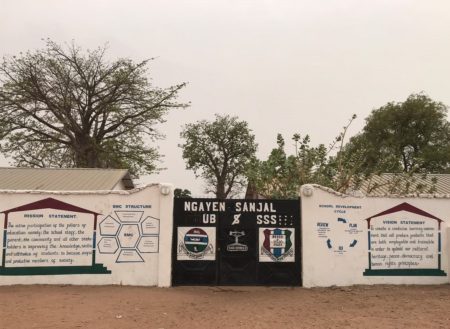
Saturday we traveled from Farafenni to the rural Senior Secondary School in Ngayen Sanjal, where 90 students were waiting for us. Unfortunately, we arrived late due to not being able to get a gelly-gelly easily, because a gelly-gelly won’t proceed until they are full of their 30+ passengers. The program began with Gambian role models discussing their career paths, and it was obvious the students were impressed with what these Gambians had accomplished, and the amount of money they were able to earn.
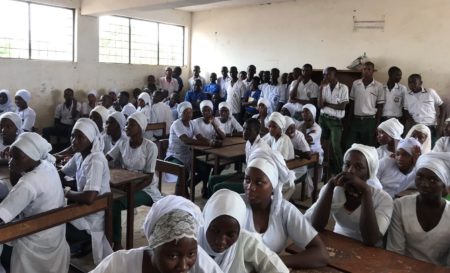
The Gambia has achieved noticeable progress implementing equal opportunity for both women and men in their communities. However, nationally, men are typically the decision-makers and bread-winners of the households while women are relegated to child-rearing and domestic work. These roles are learned from an early age and girls are often responsible for the majority of chores, while the boys are free to participate in sports and other after school activities. Socially, boys and girls are divided, rarely playing or working together. Future Trek strives to reach boys and girls while they are at an impressionable age. The intent is to expose male and female students to ideas, knowledge and skills they can work together on, breaking down gender stereotypes in order to build a better future for themselves and their communities. I was surprised that there were more girls in attendance than boys, and hopefully that will be reflected as future opportunities for girls.
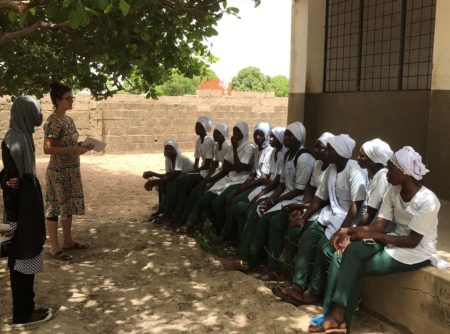
The students were divided into four groups, and they moved round robin fashion to attend four topic sessions. At Ngayen Sanjal the four topics were Sex Education, Gender Equality, Advocacy, and Stress Management. Corey and Zach taught sex education together, and after a whole group introduction, they divided the group by gender. Corey worked with the girls and Zach worked with the boys, so they could address this sensitive subject more comprehensively. Andy discussed the differences between gender and sex, and how traditional roles in The Gambia are often assigned by gender. He emphasised that only some roles are gender specific, like only girls can have babies, but that many jobs can be performed by both boys and girls. Traditionally in The Gambia, women do the laundry or cooking, but in many other cultures men are chefs or manage the home and raise the children, while their wives work outside the home. Mike talked about being an advocate for yourself, and how to develop good communication skills to reach goals. The class compared three types of advocacy: strong, weak, and aggressive and potential outcomes for each method. My topic was stress management. We defined various stressors, how the body typically responds, and healthy ways to reach out to friends and family to work through stressful situations. Then, I shared one of my favorite activities with the students – yoga. It was interesting that none of the students knew what yoga was. I began by teaching them how to use their breath to change how they felt, and the importance of posture to be able to breathe deeply. We learned tree pose and how a steady breath can help with balance. We then practiced tree pose with a partner, to reinforce the benefits of having a trusted friend to help relieve stress and give support throughout life.
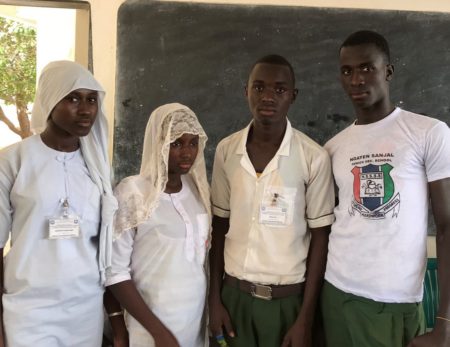
After we completed all the sessions, the five PCVs discussed which students would be good candidates to attend Camp GLOW. It was difficult to select just two girls and two boys because the level of participation by most of the students was outstanding. We selected teacher Alasan Bah and the four students pictured above – from left to right – Maimuna Sallah, Amie Saline Secka, Samba Bah, and Ebrima Gaye. At the end of the day the school fed us a delicious lunch before we walked about a mile to the road to catch a gelly-gelly back to Farafenni.
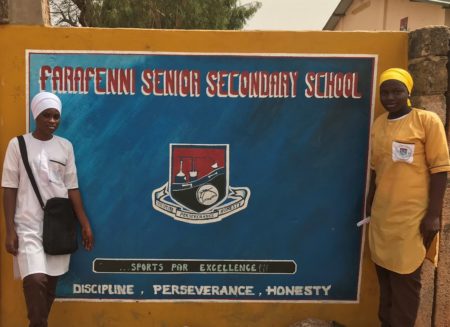
Sunday we worked with the students at the Farafenni Senior Secondary School and were able to arrive on time. The schedule for the day was similar, but at this school the students had a much better grasp on the English language which made giving our presentations easier. Again there were more girls attending Future Trek than boys, and I hope the information shared will help them seeing expanded opportunities for their future.
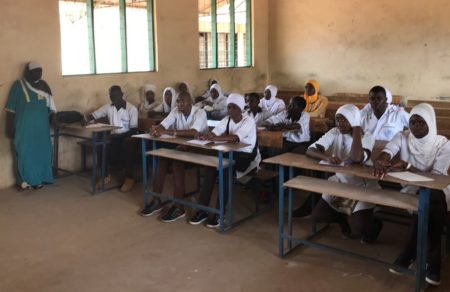
The topics were the same as the day before with the exception of my sessions, where I covered Healthy & Unhealthy Relationships instead of Stress Management. I had eight unhealthy relationship definitions, and we discussed how an unhealthy relationship can be changed to be more healthy. I enjoyed working with the students at both schools, but I preferred teaching the stress management class on Saturday because it included movement, and my favorite activity – yoga. It gets very hot here and by the third and fourth classes I could see that it was hard for everyone to pay attention. The Future Trek planners are asking us to do evaluations of our experiences, and I will recommend incorporating more movement or games into the curriculum.
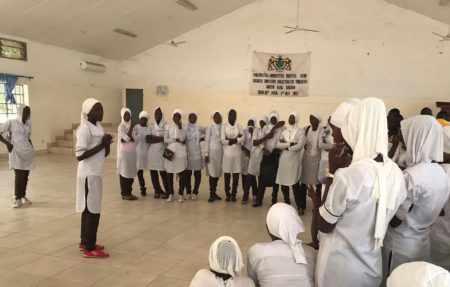
It was encouraging to see the level of participation by all of the students. Teaching techniques in The Gambia are heavy on memorization or call and response learning. The official language is English and all schools are required to teach in English, but most families do not speak English in the home. Although everyone in The Gambia speaks several languages, many students struggle with reading and writing English. Critical thinking, volunteering answers and public speaking are not emphasized. We were very impressed, when four girls at Farafenni asked if they could make an all school presentation about what they learned. It was encouraging to see so many students interested in preparing for a successful future.
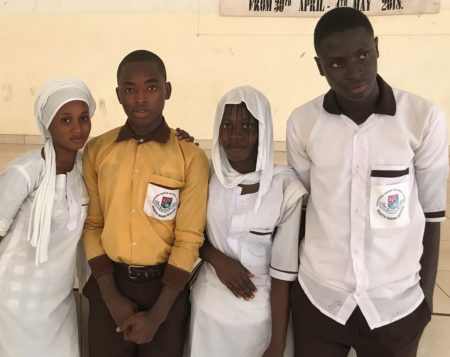
The four students selected in Farafenni to attend Camp GLOW are pictured above – from left to right – Isatou Bah, Joe Bass, Awa Ndow, and Mustapha MS Njie. Peter Odebajo was selected to accompany these students to Massembeh in July.
I am glad that my PC work here has many opportunities to do cross-sectorial projects. It gives me a fuller sense of what PC in doing in country and I get to work with so many wonderful PCVs.